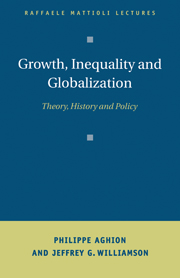Book contents
- Frontmatter
- Contents
- Preface
- Introduction
- Part I Inequality and economic growth
- Part II Globalization and the labor market: using history to inform policy
- 1 Globalization, labor markets and convergence in the past
- 2 Globalization and the causes of workers' living standard convergence in the past
- 3 Policy backlash: can the past inform the present?
- Author index
- Subject index
3 - Policy backlash: can the past inform the present?
Published online by Cambridge University Press: 04 November 2009
- Frontmatter
- Contents
- Preface
- Introduction
- Part I Inequality and economic growth
- Part II Globalization and the labor market: using history to inform policy
- 1 Globalization, labor markets and convergence in the past
- 2 Globalization and the causes of workers' living standard convergence in the past
- 3 Policy backlash: can the past inform the present?
- Author index
- Subject index
Summary
Can the past inform the present?
It turns out that the late nineteenth and the late twentieth century shared more than simply globalization and convergence. Globalization also had the same impact on income distribution: inequality rose in rich countries and fell in poor countries; though much debated, some think the same trends are apparent now. And while globalization, according to some, accounted for about a third to a half of the rise in inequality in America and other OECD countries since the 1970s, it probably accounted for more in the late nineteenth century. It also appears that the inequality which globalization produced prior to World War I was partly responsible for the interwar retreat from globalization. What is in store for the future? Will the world economy retreat once again from globalization as these inequality side effects in the rich OECD have their political impact?
As we have seen, there were three epochs of growth experience after the mid nineteenth century for what is now called the OECD: the late nineteenth-century belle epoque, the dark middle ages between 1914 and 1950, and the late twentieth-century renaissance. The first and last epochs were ones of overall fast growth, convergence (poor countries catching up on rich), and globalization (trade booms, mass migration and huge capital flows). The middle ages were ones of overall slow growth, de-globalization, and divergence. Thus, history offers an unambiguous positive correlation between globalization and convergence. When the pre-World War I years are examined in detail, the correlation turns out to be causal: the last chapter argued that globalization served to play the critical role in contributing to convergence; it took the form of mass migration and trade.
- Type
- Chapter
- Information
- Growth, Inequality, and GlobalizationTheory, History, and Policy, pp. 169 - 200Publisher: Cambridge University PressPrint publication year: 1999



